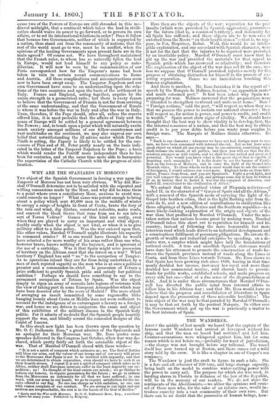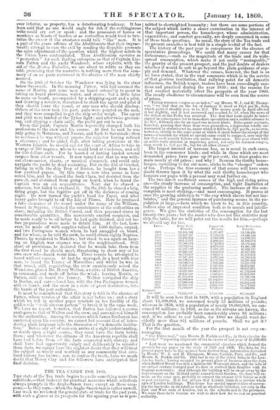THE WANDERER.
ABOUT the middle of last month we heard that the captain of the famous yacht Wanderer had arrived at Liverpool without his ship, and that the men on board had mutinied and left him. Counter-accusations were whispered against him, but for some reason which is not before us,—probably for want of jurisdiction, —the charge was not brought before any tribunal. The vessel itself has now turned up at Boston, and there comes out a wild story told by the crew. It is like a chapter in one of Cooper's sea romances.
The Wanderer is just the craft to figure in such a tale. She is a fore and aft schooner of 250 tons, and large storage capacity, being built on the model to combine water-cutting power with the power to carry sail. The purpose for which she was used, in landing slaves in Florida in defiance of the law of the Republic, will be in the memory of our readers. We do not share the sentiments of the Abolitionists,—we abhor the opinions and coun- sel of those men who, for the sake of an inferior race, would in- troduce anarchy into a vast community of their own race. But there can be no doubt that the possession of human beings, how- ever inferior, as property, has a deteriorating tendency. It has been said that no one would angle for fish if the certitaginous
tribe could cry out or speak ; and the possession of horses or monkeys as beasts of burden or as curiosities would tend to bru- talize the owner if the creatures could talk "like" men. It is a part of the grave offence of the Abolitionists that their imprac- ticable attempt to cure the evil by rending the Republic prevents the calm adjustment of the question which the highest minds in the Union have contemplated. Thus Abolitionism operates as "protection" for such trading enterprise as that of Captain Lin- coln Patten and the yacht Wanderer, whose exploits, with the aid of the .13‘..stwi Traveller, we are about to relate as they are told, premising that the narrative is nothing more than the sum- mary of an ex parte statement in the absence of the man chiefly accused.
On the 20th of October the Wanderer was lyin.t' in the river below Savannah. In the morning Patten, who had assumed the name of Martin, put some men on board ostensibly to assist in taking on board provisions, water, and stores ; but a little later he came on boafd, accompanied by a shipping-agent and a pilot, and drawing a revolver, threatened to shoot the agent and pilot if they should leave the vessel, or any man who should disobey. Others of the crew took his part, guns were pointed on the men, and they were compelled to get the ship under weigh. The agent and pilot were landed at the Tybee light ; and after twice ground- ing, and slipping a chain cable, the yacht got out to sea.
From this point, Captain Martin repeatedly changed both his professions to the crew and his course. At first he said he was only going to Matanzas, and Nassau, and back to Savannah ; then he confessed he was without papers, the collector having refused a clearance ; and he added that, after taking. provisions at the Western Islands, he should sail for the coast of Africa to take in a cargo of 700 negroes, whom he could land at Cardenas and sell for 650 dollars each. For he boasted of having landed several cargoes from other vessels. It now turned out that he was with- out chronometer, charts, or nautical almanaek, and could only navigate the yacht by dead reckoning. But on the 23d of October, falling in with the ship Troy of Boston, he bought from her a few nautical papers. By this time a new idea seems to have seized him, and he chased the bark Clara, but desisted from the pursuit, and abstained from going on board, when he found the Captain was an old acquaintance. Next day he chased a schooner, but failed to overhaul it. On the 28th he chased a brig, firing grape, but the fugitive got off in the darkness of coming night. He now turned the yacht's head for Fayal, and after heavy gales brought to off the Isle of Flores. Here he produced a false clearance of the vessel under the name of the William, bound to Smyrna, obtained the countenance of the authorities on shore, including the British Consul, and thus procured stores in considerable quantities. His movements excited suspicion, and he made ready to be off before he had quite finished, and not be- fore preparations were made to detain him. At the last, how- ever, he made off with supplies valued at 1500 dollars, unpaid, and Portuguese women whom he had smuggled on board, and for whom, as he told the crew, he could obtain eighty Negroes. Thence he wandered to Madeira ; but stood to sea again on hear- ing an English war steamer was in the neighbourhood. Still short of provisions, he declared that he would take them from the first vessel he should meet, threatening to shoot any of his own crew who should resist him. Three vessels he attempted to board without success. At last he managed, in a boat with four men, to board the Tenney of Marseilles ; and whilst he was in that vessel, still negotiating, the crew unanimously seized the Wanderer, placed Mr. Henry 'Welton, a native of British America, in command, and made off before the wind ; leaving Martin, or Patten, still on board the Tenney. Welton navigated the ship to Boston, and surrendered her, with the two Portuguese women still on board, and the crew in a state of great destitution, into the hands of the port authorities.
It must be remembered that this story is told in the absence of Patten, whose version of the affair is not before us ; and a story which we tell in another paper reminds us too forcibly of the ..olden rule " audi alteram partem " to break it in the same week. 'We have no report, however, that Patten has followed a course analogous to that of Welton and the crew, and surrendered himself to the authorities. Among the services which James Buchanan has conferred upon his country, we cannot but account that of intro- ducing plain language into the discussion of "a domestic institu- tion." Before any set of men can arrive at a right understanding, or decide upon a right course, they must have the facts before them ; and whenever the citizens of the American republic shall have had before them all the facts connected with slavery, and shall have had opportunity calmly and deliberately to consider those facts, we cannot have the slightest doubt that they will treat the subject as wisely and worthily as any community that civi- lized history has known ; nor, to confess the truth, have we much doubt that Henry Clay and his followers have anticipated that final decision.



























 Previous page
Previous page